Case contribution: Dr Radhiana Hassan
Clinical:
- A 60 years old lady
- Presented with left breast lump.
- Mammogram and ultrasound done show a suspicious lesion in the left breast.
- Biopsy shows invasive ductal carcinoma.
- Wide local excision with axillary LN resection done
- After that she received 6 cycles of chemotherapy followed by radiotherapy
- Mammogram and ultrasound breasts done for surveillance, about 8 months after completed radiotherapy
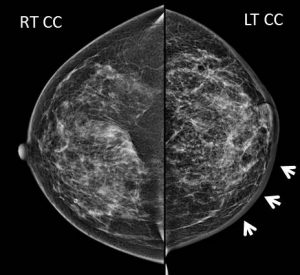
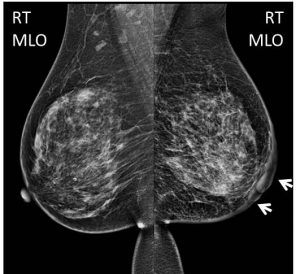
Mammogram findings:
- The breasts display scattered areas of fibroglandular density (BIRADS density B).
- Left breast is smaller with associated architectural distortion in keeping with previous operation.
- Slight increased density is also observed at left breast with no dominant mass seen.
- Generalised skin thickening seen at left breast with its maximum diameter measuring about 7 mm.
- No suspicious cluster of microcalcification.
- Shotty right axillary nodes with preserved fatty hilum are observed.
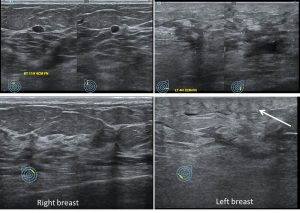
Ultrasound findings:
- The right breast demonstrates normal fibroglandular echogenicity and echotexture.
- A small well-defined hypoechoic lesion with posterior enhancement is seen at the right 11H measuring about 0.4 cm x 0.6 cm x 0.4 cm (AP x W x CC).
- The left breast appears oedematous particularly at the lower outer quadrant with loss of differentiation between the subcutaneous fat and fibroglandular tissues (white arrow).
- An irregular hypoechoic lesion with mild posterior shadowing is identified at left 5H, measuring about 0.4 cm x 0.5 cm x 0.5 cm (AP x W x CC). No internal vascularity is noted. This could represent scar tissue.
- No significant left axillary lymphadenopathy is seen.
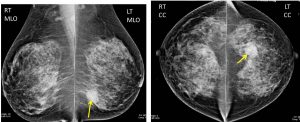
Progress of patient:
- Subsequent mammogram done after one year shows resolution of previously seen skin thickening
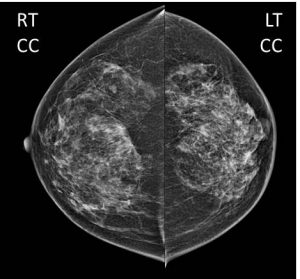
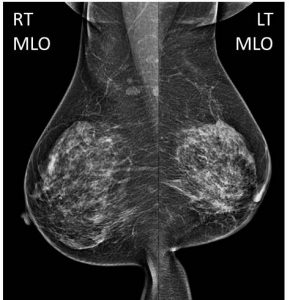
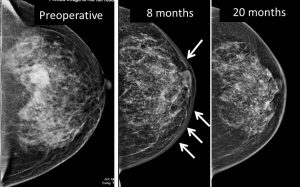
Discussion: Skin thickening post radiotherapy
- Normal skin thickness is 2 mm. Post radiation mammogram can show skin thickening with skin thickness can reach 1 cm or greater.
- Mammogram shows maximal skin thickening during the first 6 months after completion of therapy and then diminish or attain stability for many patients within 2- 3 years.
- Skin thickening after radiation is secondary to breast oedema from the damage of small vessels. Acute period of irradiation causes increased vascular permeability of breast tissue causing the breast oedema.
- It manifests as skin and trabecular thickening. It is best appreciated when compared with contra-lateral breast or with pre-treatment mammogram.
- In case of worsening skin thickening or breast oedema, differentials include lymphatic spread of cancer, obstructed venous drainage, congestive heart failure and infection. Further investigation is warranted in these cases.
